Have you ever tried working on any complicated music production software, wondering how to use the hundreds of nubs and features?
Try doubling the difficulty by not using the mouse; how tricky is it now to edit, drag and record, especially if you're using hundreds of plug-ins?
Now turn off the screen and use the voice commands, and only then you will begin to appreciate the story of determination that has led Egyptian musician Wael El-Sayed to where he is today.
"Music is life for me... I don't classify myself as a professional musician. I always prefer to play with my friends or people I can hang out with in my pyjamas. The music I play must represent me somehow. This is definitely an amateur behaviour,” El-Sayed, who plays accordion and percussion, said about his “friends”, who in fact represent a huge part of contemporary Egyptian music.
El-Sayed is one of the most essential musicians in the alternative current, which many like to call the underground scene. He is a part of some of the most important bands like Wust El-Balad and Dina El Wedidi's band, and has played with the majority of the others, from El-Dor El-Awal, to Massar Egbari, to Cairokee, to HOH and the German-Egyptian Cairo Steps.
In addition, he has collaborated with some of the most well-known mainstream singers across the Arab world, including Saudi Mohamed Abdu and Moroccan Asma Lamnawar.
This musician, who describes himself as “an amateur”, has played accordion and percussion in thousands of concerts all over Egypt, and has performed abroad in countries all over the world, including the UAE, Lebanon, and Tunisia in the Middle East, Senegal and Zimbabwe in sub-Saharan Africa, in the UK, France, Germany Italy, Switzerland, Denmark and Norway in Europe, and in the US.
Ahram Online met Wael El-Sayed at his newly established home-studio in Maadi to hear his story of determination, passion and inspiration.
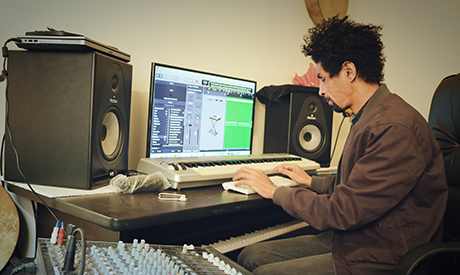
Wael El-Sayed at his newly established home-studio in Maadi, February 2019 (Photo: Eslam Omar)
Discovering a love of music
Born on 23 June 1976 in the humble Alexandrian neighbourhood of Gabriel to a sailor father, the eldest of three siblings discovered early on that music would be his life’s work.
"I was four-and-a-half years old when I stepped into the stage during my uncle's wedding to dance with Bahr Abo Gresha [a prominent Nubian musician and singer]. He was performing with his band and I kept jumping and dancing on the stage under the musicians’ feet. At this moment I decided I wanted to be like these people. This is what I wanted to do," he said.
At Al-Nour school for blind students, the young El-Sayed found his heaven in the music room. He tried all the instruments he found before quickly mastering the keyboard.
He also joined the Fajr Association for the Blind, with music instructor Ibrahim El-Asmar, playing various instruments including oud and cello, in addition to playing keyboard commercially and developing his MIDI skills in using the sequencer to produce accompaniment tracks for the most commercially requested songs.
"I couldn't afford to buy an accordion at that time. In my teenage years I joined many local bands that played at weddings in Alexandria,” he said.
“I played in every imaginable place, from small theatres and clubs to weddings in streets and on rooftops. I became known in the scene of 'El-Biasah', which is something like Mohamed Ali Street in Cairo [a neighbourhood where belly-dancers and wedding musicians live]."
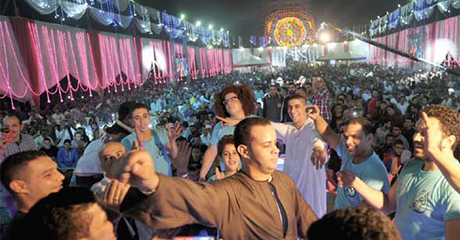
A photo of a typical local wedding (Photo: Ahram)
The young El-Sayed was asked to memorise hundreds of oriental songs, from the very traditional and classical to the contemporary pop and shaabi. His repertoire included Oum Kalthoum, Abdel-Halim Hafez, Abdel-Wahab, Farid El-Atrash and Mohamed Fawzi as well as Abo Greisha, Tarek El-Shiekh, Magdi Talaat and Hassan Al-Asmar.
"I used to play whatever the listeners wanted. Once, a guest stepped up on the stage asking me to play Thawret El-Shak [a well-known Oum Kalthoum song] and it was so unsuitable to play at a wedding so I hadn’t memorized it," El-Sayed continues with laughter "so to handle the situation, I convinced him that the key of Oum Kalthoum on my keyboard didn’t work."
Theatre tragedy
Young El-Sayed was involved in many activities besides music; he was on the national team for goalball [a Paralympics football game], and won international competitions before he retired due to successive injuries.
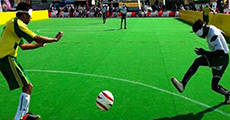
Goalball participants compete in teams of three, and try to throw a ball that has bells embedded in it into the opponents' goal (photo: Ahram)
But one of his biggest passions was theatre.
"I started participating in theatre at the age of six, and theatre quickly became the best thing I did. I know all the details of theatre, even the very technical details. In theatre, I participated in acting, writing and adapting, performing and writing music. I even directed the lighting itself. You could say I was raised in the theatre," he said.
However, a national tragedy which saw him lose many close friends severed his links with the theatre.
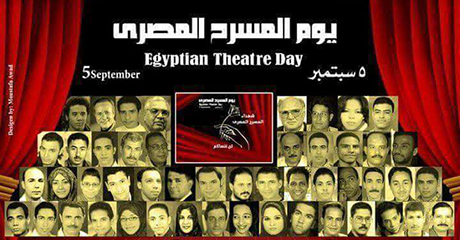
A widely-spread design of the martyrs of Bani Swif disasters
Over 50 people were killed and dozens were seriously injured when a huge fire broke out during a play being performed at Beni Suef Cultural Palace in September 2005.
"I lost half of my friends in one frightening night," he said with emotion.
"I survived, but I lost many of the people that inspired my theatre experience, and some very close friends including [director and writer] Moemen Abdo, [director and actor] Yasser Yassin, and one of my favourite instructors [writer] Nizar Samak.
"After the disaster, many of my friends and I quit the theatre."
‘He changed the way I look at music’
Like many of the big musicians on Egypt’s underground scene, El-Sayed’s musical career took off as the result of a workshop run by a veteran whose protégés like to call him “the Godfather.”
"I bought my accordion in 2006. Before that date, the music scene wasn't that obviously divided. Beside the activities I took part in, I used to have a band called Amwag performing my music compositions. But things totally changed when I met Fathy Salama. It was a real turning point," El-Sayed explained.
Salama is a successful composer and producer who worked in commercial pop in the 70s and 80s, collaborating with the scene's giants like Amr Diab and Mohamed Mounir. He then formed his band Sharkiat, with which he found fame on the regional and global jazz scene. He became the first Grammy Award winner in the Arab world in 2005.
He also went on to inspire dozens of Egypt’s underground musicians during his workshops.
"This giant icon Fathy was the teacher I was looking for. He is a great musician I had always adored and he is also a great teacher. He is a school that leaves your talent breathing with minimum rules and maximum experience. He changed the way I looked at music," El-Sayed said.
"Fathy Salama is present in each and every note I play or write."
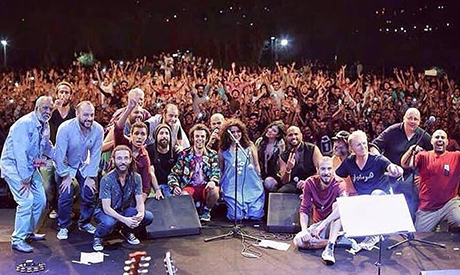
Fathy Salama featured Masar Egbari, Sharmoofers, Dina El-Wedidi and others furing International Music Day 2017
As a result of a workshop with “the Godfather" in Alexandria, El-Sayed expanded his network, meeting and collaborating with many of the musicians he currently works with, before deciding to move to Cairo in 2008.
He also became a student of the great violinist Abdu Dagher, who had collaborated with Oum Kalthoum and Abdel-Halim Hafez and has played a big role in shaping the music scene since then. He is an icon within oriental music, known especially for his solo techniques and for his moving between various Arabic scales.
"Listening only to Dagher's music makes you aware of many secrets of oriental music, more than any other musician. He taught me that talent is a gift from God."
Wust El-Balad
Today, El-Sayed works with numerous bands and acts.
He prefers to introduce himself mainly as "an accordionist in Wust El-Balad”, the band that played a key role in shaping Egypt’s underground scene with their success in the 2000s.
"Wust El-Balad is the home where I get the opportunity to take part in the compositions and arrangement. The way we work in Wust El-Balad is my favourite. It's a model for teamwork," he said.
Wust El-Balad are celebrating their twentieth anniversary this year; they do not perform regularly at present, as their co-founder and lead singer Hany Adel is currently acting in films and on television, but they are scheduled to perform at Cairo Jazz Club this month.
Wust El Balad – El Leil (EXCLUSIVE Video) | 2018 | وسط البلد –الليل الي ملوش اخر
Their most recent album, Bantalony El-Jeans, was released last year; it is their fourth CD after Wust El-Balad (2007), Rubabekya (2011) and Karakib (2014).
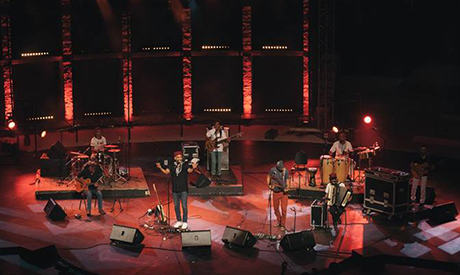
Wael with his favorite band Wust El-Balad
Dina El Wedidi
El-Sayed’s accordion solos have always a big part of the repertoire of singer Dina El Wedidi, who has in recent years gained success not only in Egypt, but also abroad, playing shows across the United States, Europe and Africa.
Her music style has significant Egyptian, and wider African, influences, and she has collaborated with the Nile Project, an initiative that includes musicians from Nile Basin countries.
"Dina was my best friend and sister even before she decided to sing. I was with Dina from the first concert and I have only skipped three concerts of hers in eight years. She never stops amazing me with her real talent and pure primitiveness. She has a very unique project," El-Sayed said.
El-Sayed went on tour with El Wedidi in the US last year, playing in many important venues, as part of Center Stage initiative.
She released her second album Slumber, which has a different sound to her previous work, Turning Back (2014), during the tour.
Taksir Sharqi
Taksir Sharqi are a folk band, founded in 2017 by Wust El-Balad's Ahmed Omran. They play very traditional styles like Gnawa and Zar, but merge them with modern tunes and arrangements.
"I am in love with beginnings,” says El-Sayed, who is part of the band. “This very special project has my heart. I am very happy that Omran is finally producing his music."
Featuring famous Zar vocalists Madiha Om Sameh and Abdel-Rahman Balala, Taksir Sharqi are finalising their first album Maana and they are performing regularly at Cairo music venue Makan.
Asia Madani
El-Sayed also plays accordion and percussion with Cairo-based Sudanese songwriter, vocalist and percussionist Asia Madani, who also participated in the Nile Project.
Madani is known internationally for her deep-rooted traditional Sudanese folk repertoire.
"Asia is a great artist who has taken on her shoulders the responsibility of spreading the Sudanese folk outside its origin,” he says.
“Her project is half Egyptian as well, and I collaborate on that with some of my best friends, including Wust El-Balad's [bassist] Ahmed Omar, Ahmed Omran and Bob.”
Madani released her album Al-Zoul in 2018.
She is currently involved in activism against the Omar Al-Bashir regime. She also participated in Sauti za Busara festival in Tanzania in February and will perform at the Cairo Jazz Club on 9 March.
Cairo Steps
El-Sayed is also part of Cairo Steps, a German-Egyptian musical ensemble founded by Basem Darwisch, and played with the group at a concert against extremism in Minya in December.
He says his role in the group is small but “influential and unique.”
“I find with them things I miss, like committing to a strict process instead of experimenting and improvising like in my other projects,” he said.
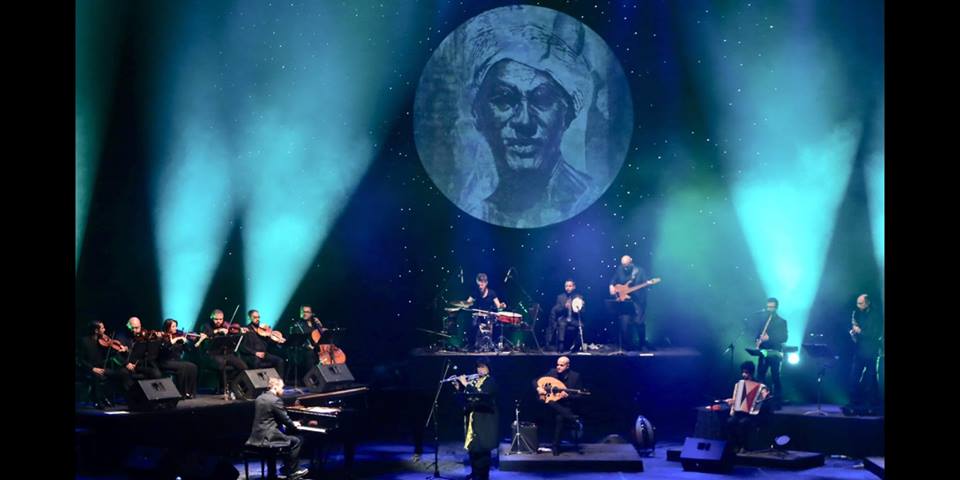
Wael El-Sayed (R) plays with Cairo steps that frequently feature flutist Enas Abdel Dayem (C) currently minister of culture
“Cairo Steps have brought together courage of the underground and the quality of the mainstream."
Regularly performing in Germany, Cairo Steps, conducted by Sebastian Müller-Schrobsdorff and frequently featuring Islamic chanter Ihab Yunis, were co-awarded the German Jazz Award in Berlin in April alongside German band Quadro Nuevo for their joint album Flying Carpet.
Black & White
One of El-Sayed's favourite projects is his work with prominent keyboardist Fesal Fouad.
They have written an album together as the duo Black & White and performed a few concerts, but they are re-recording the album, to be released in April, and preparing the second, which will feature many guests.
"Fesal and I are more than friends. He is my younger brother. We understand each other without saying a single word. He is one of my teachers. He taught me a lot, especially in harmony, and made me open to styles I didn't use to hear," he said.
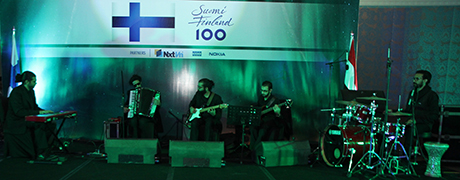
One of the very first concerts of Black and White was at the celebration of Finland of their 100th Independence Day, 2017
"We know everything about each other’s music and we hang out most of the time. In Black & White, we experiment freely and create music in a level of cooperation that I really find hard to reach with any other musician."
Cairokee, Massar Egbari and others
El-Sayed is also frequently featured with the instrumental oriental jazz band El-Dor El-Awal, one of the oldest bands on the scene, substituting for any of the lead oriental instruments.
He has also frequently featured with big names Massar Egbari, and with Cairokee. He recorded four songs on the latter’s album El-Sekka Shemal, including one track with Algerian singer Souad Massi.
He is also a favourite choice for Sudanese singer Beshir, Palestinian composer and singer Huda Asfour, and French flutist Maisam Galal and he speaks highly about each.
"As I said, I only play with friends, and they are all my friends and I know their music very well," he said.
Egyptian music’s deep variety
El-Sayed, who is rooted in Egyptian traditional music, also expressed his sorrow over the situation of his country's output currently.
"Egyptian music is a way wider than we hear now. We used to have a big variety of sung forms like door, Tatoa, Mwashah and Ebtihal, besides a wider variety of instrumental forms like longa, bashraf, samai, fantasia, dolab and tahmila. I dream of the day when Egyptian music became wider and takes back its identity,” he said.
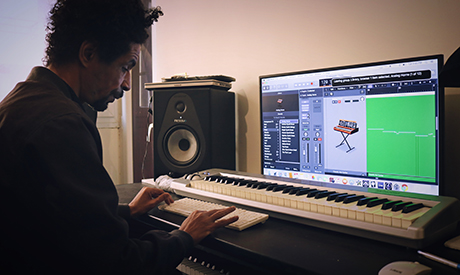
Wael El-Sayed at his newly established home-studio in Maadi, February 2019 (Photo: Eslam Omar)
"When you hear the recordings of Sayed Darwish and Kamel El-Kholay, you will find their tuning is different from what we are used to hear," he says, explaining that before the 1930s, Egyptian music wasn't tuned on a piano like it is now.
Unstoppable, El-Sayed is currently developing his recording and producing music techniques and has already created products, with the support of his arsenal of expert friends like producers Hani Adel, Fesal Fouad and Gehad El-Telbany, and sound engineer Taher Saleh.
"Music is a hobby, a job and entertainment for me. Music is the main communication tool use to deal with people. Music is life for me and I hope my music continues living after I leave this world as part of me," he concluded.
For more arts and culture news and updates, follow Ahram Online Arts and Culture on Twitter at @AhramOnlineArts and on Facebook at Ahram Online: Arts & Culture
Short link: